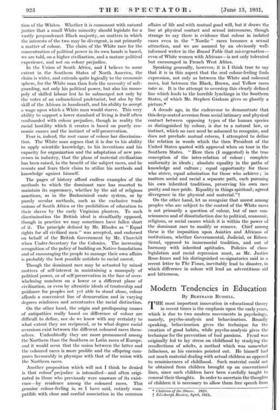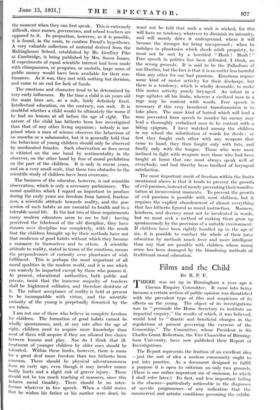Modern Tendencies in Education By BERTRAND RUSSELL.
* Children of the Slave3. 1920.
f Edinburgh Revielv, April, 1921.
the moment when they can first speak.. This is extremely difficult, since nurses, governesses, and school teachers are opposed to it. In proportion, however, as it is possible, it is found, in the main, to confirm Freud's hypotheses. A very valuable collection of material derived from the Maltinghouse School, established by Mr. Geoffrey Pike at Cambridge, is being published by Mrs. Susan Isaacs. If experiments of equal scientific interest had been made with chimpanzees, or penguins, or axolotls, large sums of public money would have been available for their con- tinuance. As it was, they met with nothing but derision, and came to an end for lack of funds.
The emotions and character tend to be determined by very early influences. By the time a child is six years old the main lines are, as a rule, fairly definitely fixed. Intellectual education, on the contrary, can wait. It is doubtful whether a child would be ultimately the worse if he had no lessons at all before the age of eight. The nature of the child has hitherto been less investigated than that of any other living organism ; nobody is sur- prised when a man of science observes the behaviour of an amoeba or a salamander, but it is generally held that the behaviour of young children should only be observed by uneducated females. Such observation as does occur is vitiated on the one hand by sentimentality in the observer, on the other hand by fear of moral prohibition on the part of the children. It is only in recent years, and on a very small scale, that these two obstacles to the scientific study of children have been overcome.
The business of the educator, however, is not scientific observation, which is only a necessary preliminary. The moral qualities which I regard as important to produce during the early years are freedom from hatred, fearless- ness, a scientific attitude towards reality, and the pos- session of such habits as are essential to health and to a tolerable social life.' In the last two of these requirements many modern educators seem to me to fail ; having perceived the falsehood of the old discipline, they have thrown over discipline too completely, with the result that the children brought up by their methods have not that modicum of good habits without which they become a nuisance to themselves and to others. A scientific attitude to reality, stated in terms of the emotions, means the preponderance of curiosity over phantasies of wish fulfilment. This is perhaps the most important of all moral qualities in the modern world, and it is one which can scarcely be imparted except by those who possess it. At present, educational authorities, both public and private, insist that the immense majority of teachers shall be frightened celibates, and therefore destitute of it. The robust acceptance of reality is held at present to be incompatible with virtue, and the scientific curiosity of the young is perpetually thwarted by the sex taboo.
I am not one of those who believe in complete freedom for children. The formation of good habits cannot be wholly spontaneous, and, at any rate after the age of eight, children need to acquire more knowledge than most of them will acquire if they are allowed free choice between lessons and play. Nor do I think that ill- treatment of younger children by older ones should be tolerated. Within these limits, however, there is room for a great deal more freedom than has hitherto been common. There should be physical adventurousness from an early age, even though it may involve minor bodily hurts and a slight risk of graver injury. There should not be too much teaching of manners, since this induces social timidity. There should be no inter- ference whatever in free speech. When a child states that he wishes his father or his mother were dead, he must not be told that such a wish is wicked, for this will have no tendency whatever to diminish its intensity, and will merely drive it underground, where it will become the stronger for being unexpressed ; when he indulges in phantasies which shock adult propriety, he must not be met by a horrified " Hush ! Hush ! " Free speech in politics has been defended, I think, on the wrong grounds. It is said to be the Palladium of our liberties, but the fact is that it is an outlet less harmful than any other for our bad passions. Emotions require some kind of motor activity for their discharge, but there is a tendency, which is wholly desirable, to make this motor activity purely laryngeal. An infant in a rage agitates all his limbs, whereas a civilized man in a rage may be content with words. Free speech is necessary if this very beneficent transformation is to take place. The same kind of hatred which will lead a man prevented from speech to murder his enemy may lead a thoroughly verbalized man to be content with a biting epigram. I have watched among the children in my school the substitution of words for deeds : at first they fought each other with any weapons that came to hand, they then fought only with fists, and finally only with the tongue. Those who were most inclined to fight with weapons were those who had been taught at home that one must always speak well of everybody, and had thereby been baulked of laryngeal satisfaction.
The most important merit of freedom within the limits mentioned above is that it tends to prevent the growth of evil passions, instead of merely preventing their manifes- tation at inconvenient moments. To prevent the growth of evil passions is possible with most children, but it requires the explicit abandonment of almost everything that has hitherto figured as moral instruction. Manners, kindness, and decency must not be inculcated in words, but we must seek a method of making them grow up spontaneously by the provision of a suitable environment. If children have been rightly handled up to the age Of six, it is possible to conduct the whole of their later education by methods much freer and more intelligent than any that are possible with children whose moral sense has been damaged by the blundering methods of traditional moral education.







































 Previous page
Previous page